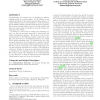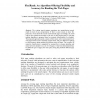411 search results - page 13 / 83 » Temporal Ranking of Search Engine Results |
WWW
2009
ACM
14 years 8 months ago
2009
ACM
Understanding user intent is key to designing an effective ranking system in a search engine. In the absence of any explicit knowledge of user intent, search engines want to diver...
KDD
2005
ACM
14 years 8 months ago
2005
ACM
This paper presents a novel approach for using clickthrough data to learn ranked retrieval functions for web search results. We observe that users searching the web often perform ...
ICDCIT
2005
Springer
14 years 1 months ago
2005
Springer
The existing search engines sometimes give unsatisfactory search result for lack of any categorization. If there is some means to know the preference of user about the search resul...
DKE
2007
13 years 7 months ago
2007
Despite the effectiveness of search engines, the persistently increasing amount of web data continuously obscures the search task. Efforts have thus concentrated on personalized...
SOCIALCOM
2010
13 years 5 months ago
2010
We explore the hypothesis that it is possible to obtain information about the dynamics of a blog network by analysing the temporal relationships between blogs at a semantic level, ...


